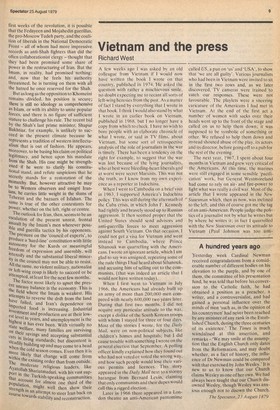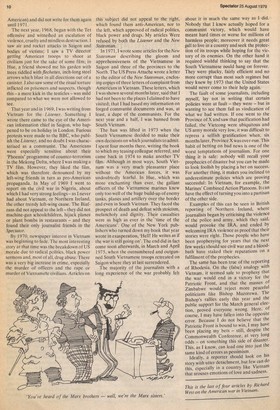A hundred years ago
Yesterday week Cardinal Newman received congratulations from a considerable number of different bodies on his elevation to the purple, and by one of them, the committee of his presentation fund, he was told that before his conversion to the Catholic faith, he had obtained a position as a preacher, a writer, and a controversialist, and had gained a personal influence over the minds of men `such as, in the opinion of his countrymen' had neVer been reached by any minister of any rank in the Established Church, during the three centuries of its existence,' The Times is much scandalised at this assertion, and remarks — 'We may smile at the assumption that the English Church only dates from the Reformation, and may doubt whether, as a fact of history, the influence of Dr Newman could be compared with that exercised by John Wesley.' It is new to us to know that our Church claims Wesley as one of her own. We had always been taught that our Church disowned Wesley, though Wesley was anxious enough not to disown the Church. American) and did not write for them again until 1971.
The next year, 1968, began with the Tel offensive and witneed an escalation of violence, cruelty and mindless destruction. I saw air and rocket attacks in Saigon and bodies of victims; I saw a TV director getting American troops to shoot at civilians just for the sake of some film; in Hue, a friend showed me his garden with trees riddled with flechettes, inch-long steel arrows which blast in all directions out of a canister.! also saw some of the ritual torture inflicted on prisoners and suspects, though this – a mere kick in the testicles – was mild compared to what we were not allowed to see.
That year and in 1969, I was writing from Vietnam for the Listener. Something I wrote there came to the eye of the American information chief in Saigon, who happened to be on holiday in London. Furious protests were made to the BBC, who publish the Listener, and no doubt I was characterised as a communist. The Americans were especially sensitive about their 'Phoenix' programme of counter-terrorism in the Mekong Delta, where I was making a TV film. However, they liked the film, which was therefore denounced by my left-wing friends in turn as pro-American propaganda. In May of 1969 I went to report on the civil war in Nigeria, about which I had very strong feelings – as I never had about Vietnam, or Northern Ireland, the other trendy left-wing cause. The Biafrans did not appeal to the left they did not machine-gun schoolchildren, hijack planes or plant bombs in restaurants – and they found their only journalist friends in the Spectator.
By 1970, newspaper interest in Vietnam was beginning to fade. The most interesting story at that time was the breakdown of US morale due to radical politics, black power sermons and, most of all, drug abuse. There was a very big increase in crime, especially the murder of officers and the rape or murder of Vietnamege civilians. Articles on this subject did not appeal to the right, which found them anti-American, nor to the left, which approved of radical politics, black power and drugs. My articles Were refused by both the Listener and the New Statesman. , In 1971,1 wrote some articles for theNew Statesman describing the gloom and apprehensiveness of the Vietnamese in Saigon and three of the provinces to the North. The 'US Press Attache wrote a letter to the editor of the New Statesman, enclosing copies of three letters of complaint from Americans in Vietnam. These letters, which 1 was shown several months later, said that I had not been to the places I claimed to have visited; that I had based my information on forged communist documents and was, at least, a dupe of the communists. For the next year and a half, I was banned from South Vietnam.
The ban was lifted in 1973 when the South Vietnamese decided to make their own decisions on which journalists to admit. I spent four months there, writing the book to which my teasing colleague referred, and came back in 1974 to make another TV film. Although in most ways, South Vietnam was a very much pleasanter place without the American forces, it was undoubtedly fearful. In Hue, which was more enchanting than ever, the gallant officers of the Vietnamese marines knew only too well of the huge build-up of enemy tanks, planes and artillery over the border and even in South Vietnam. They faced the prospect of death and defeat with stoicism, melancholy and dignity. Their casualties were as high as ever in the '`time of the Americans'. One of the New York publishers who turned down my book that year wrote in exasperation, 'Hell! He writes as if the war is still going on'. The end did in fact come soon afterwards, in March and April 1975, when the outnumbered and outgunned South Vietnamese troops retreated on Saigon where they at last surrendered.
The majority of the journalists with a long experience of the war probably felt about it in much the same way as I did.
Nobody that I knew actually hoped for a communist victory, which would have meant hard times or worse for millions of harmless people; moreover it needs great gall to live in a country and seek the protec tion of its troops while hoping for the victory of its enemies. On the other hand it required wishful thinking to say that the South Vietnamese could hang on forever. They were plucky, fairly efficient and no more corrupt than most such regimes but they knew by 1973 that the United States would never come to their help again.
The fault of some journalists, including myself, lay not in writing that certain policies were at fault – they were – but in wanting to see them fail as vindication of what we had written. If one went to the Province of X and saw that pacification had failed, the Vietcong were ubiquitous and US army morale very low, it was difficult to repress a selfish gratification when, six months later, Province X was over-run. This habit of betting on bad news is one of the worst temptations of journalism. For one thing it is safe: nobody will recall your prophecies of disaster but you can be made to look foolish by placing a bet on success.
For another thing, it makes you inclined to underestimate policies which are proving successful: In Vietnam, for example, the Marines' Combined Action Platoons. It can have the effect of turning you into a partisan of the other side.
Examples of this can be seen in British reporting of Northern Ireland, where journalists began by criticising the violence of the police and army, which they said, would provoke the IRA, and ended by welcoming IRA violence as proof that their stories were right. Those people who have been prophesying for years that the next few weeks should see civil war and a bloodbath have staked their reputations on a fulfilment of the prophecies. The same has been true of the reporting of Rhodesia. On the (false) analogy with Vietnam, it seemed safe to prophesy that the war would end in a victory for the Patriotic Front, and that the masses of Zimbabwe would reject more peaceful politicians like Bishop Muzorewa. The Bishop's rallies early this year and the public support for the March general election, proved everyone wrong. Here, of course, I may have fallen into the opposite error. Because I do not believe that the Patriotic Front is bound to win, I may have been placing my bets – still, despite the Commonwealth Conference, at very long odds – on something this side of disaster. This, as I know, can lead one into just the same kind of errors as pessimism. Ideally, a reporter should look on his story with utter detachment, but few can do this, especially in a country like Vietnam that arouses emotions of love and sadness.































 Previous page
Previous page